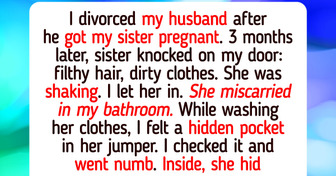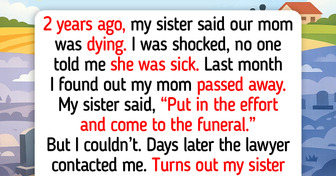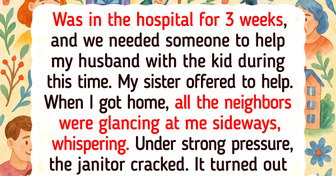14 People Who Completely Reinvented Themselves


It seems that everything is clear about our everyday life: we brush the teeth, take out the trash, take a shower. But these seemingly small things can divide even the most close-knit couples. We put together the hottest topics of domestic battles, and checked with experts, like dermatologists, dentists and other serious people in white coats, what they have to say about it.
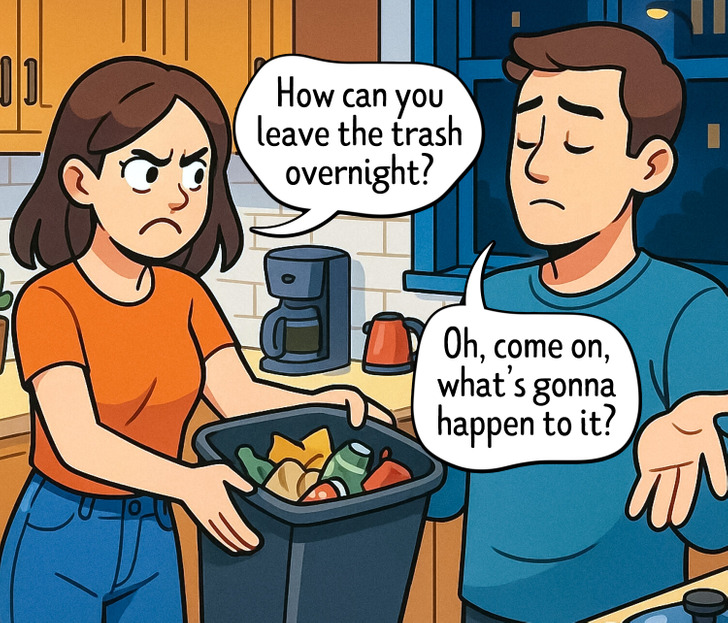
Advocates of the relaxed approach believe that if there's nothing smelly in the trash, it's no big deal if it "sleeps over" at home. Especially if the bucket has a lid. Opponents of this approach claim that any waste, especially organics, begins to decompose and attracts insects. It's uncomfortable to sleep when there is something rotting in the house.
If there is food or wet waste in the trash, it's really not worth it to delay taking it out. Even with the lid closed, bacteria and odors build up in the bucket, and flies and cockroaches can appear in a warm environment. Ideally, organics should be thrown away daily. Dry waste (paper, plastic without food residues) can be left until morning.

Those who think there is no difference say, “You can wash everything together. I put everything in the washer — underwear, jeans, and T-shirts. The main thing is color and mode.” They are sure — any normal detergent can cope with this, and if you wash in hot water, germs will definitely die.
Convenient, fast, and no fuss. The main thing is to sort the laundry correctly by color, not by purpose. Some even argue that underwear is washed better with heavy fabrics. Denim, for example, helps to “mechanically knock out” the dirt.
More sensitive people are horrified by this idea. Underwear touches intimate areas, jeans have street dust, germs, sweat. Washing them in one load is a bad idea, especially if the lingerie is lacy, delicate, or white. Jeans will wind it up, twist it and turn it into a rag.
According to recommendations, you shouldn’t wash your underwear with heavy clothing (like jeans, sweatshirts, and towels), especially if the underwear is made of delicate fabrics. Friction and weight can damage the fabric structure, stretch elastic bands and even reduce the antibacterial properties of some modern materials. In addition, underwear needs hotter water (if it’s cotton) or a gentle program (if it’s synthetic or lace), and jeans don’t like these conditions. As a result, neither of these items will be properly cleaned, if washed together.

This morning argument can cause discord even among the most tender lovers — when to brush your teeth in the morning. Some people say, “You should brush your teeth before you eat.” According to them, bacteria accumulate in the mouth overnight that get into the body together with food if you don’t brush your teeth before that. Others say, “What’s the point of brushing your teeth right after you get up, if then you still drink coffee or eat a sandwich? Consider it a waste of toothpaste.”
According to dentists, the first group is probably right. At breakfast, we often eat and drink things with acids, like coffee, tea with lemon, yogurt, or pastries. And tooth enamel softens from these acids, so brushing it afterwards is like using sandpaper.
In addition, brushing before breakfast eliminates bacteria accumulated overnight, preventing them from multiplying from sweet food. At the same time, brushing stimulates saliva production, helping to neutralize acidity and strengthen the teeth with essential minerals.

Some people believe that sleeping with a phone by their side is fine, as long as the alarm clock goes off. They charge it on the bedside table, on the bed or even under the pillow. Others object, “Are you crazy? Will you put an iron under your pillow as well?”
Especially if the cable and adapter are non-original, and the gadget itself is far from being new. The phone overheats, it may even cause a fire. And in general, sleeping with a phone is not healthy — blue light, anxiety, and sleep disturbance.
Experts advise keeping the charging phone away from your head and on a hard surface. Do not cover it with anything (especially with a pillow) and do not use cheap chargers. Overheating and fires are quite possible. Besides, the blue light of the screen does disrupt melatonin production, which is harmful to sleep.

Some people can’t imagine starting a day without an invigorating shower. Others think it’s better to shower in the evening — there’s no need to drag dust, sweat and city grime to bed. “Going to bed without showering is almost like sleeping in street clothes,” they say. And then there are also those who take it both in the morning and evening, and look at the rest of us with mild trepidation.
Dermatologists lean toward evening showers — especially for those who live in a big city and suffer from skin inflammation. Showering before bed washes away dust, sweat, allergens and grease from the skin, which can clog pores and cause irritation. A warm evening shower also improves the quality of sleep. But morning showers are also good for those who sweat a lot at night or have an oily scalp.
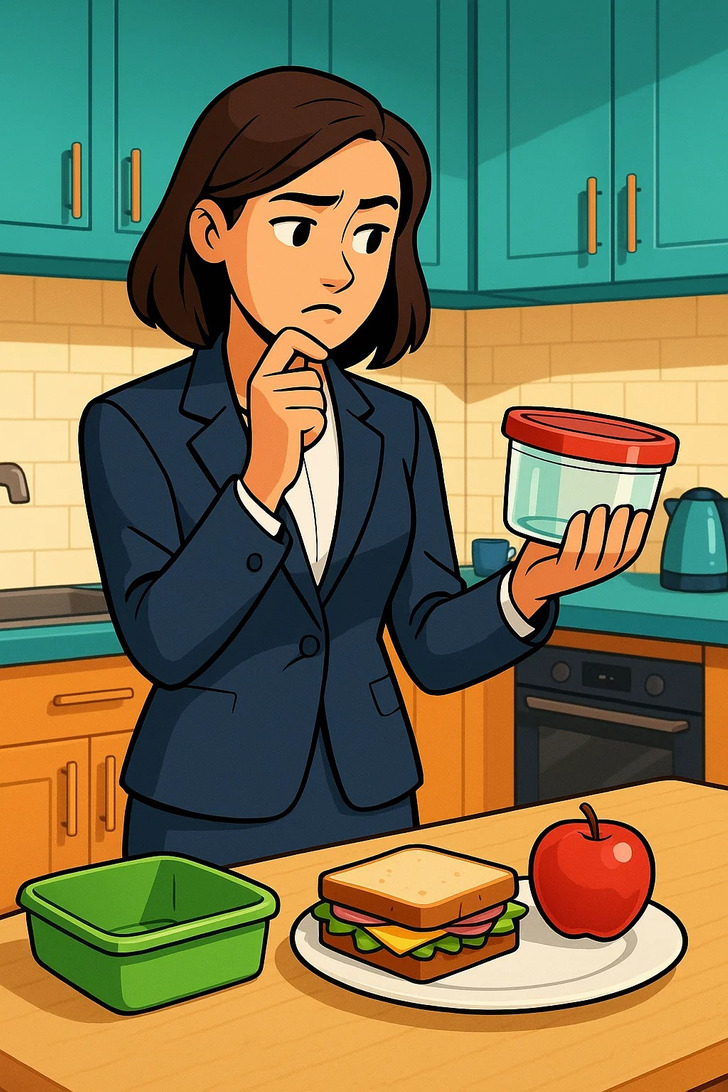
Fans of plastic note its convenience. These containers are light, inexpensive, unbreakable, ideal for traveling. They reason, “I won’t spend extra money on glass — I have a lot of food, I heat my containers in the microwave, I don’t hesitate to throw them in my bag. The plastic is durable and colorful — what more do you need?” Proponents of glass containers insist — glass doesn’t emit harmful substances, doesn’t absorb odors, and definitely won’t melt in the microwave or dishwasher.
The fans of glass are close to the truth. Yes, it has been proven that plastic is not harmless. Microplastics get into food, especially when heated or scratched. Glass containers are safe, durable, eco-friendly, and emit no harmful substances.
Glass is safer for hot, acidic, or greasy food. Plastic can be used for dry or rarely heated foods, but these containers should be replaced more often. Also, avoid cheap or old containers to reduce risks.

Some people are sure: jeans should be washed as often as simple trousers or skirts, “You wear them outside, sit in them anywhere, and they absorb all odors.” Others believe that the dense fabric of jeans doesn’t need the same frequent washing. There are also those who believe that jeans become only better in wear.
And what do experts say? Washing jeans every week is excessive. According to experts, including representatives of manufacturers and dermatologists, it is optimal to wash them after 5-10 wears, or if they are really dirty.
Frequent washing not only washes out the color and spoils the shape, but also shortens the lifespan. They advise airing the jeans, cleaning only dirty spots, and washing them inside out in cold water without spinning.

Those who sleep with an open window even in bitter cold will never understand those who put on pajamas and climb under the duvet even in hot weather. Of course, it’s a matter of personal preferences. But is there a scientific basis for any position?
It is indeed better to sleep in the cool. The optimum temperature for falling asleep and deep sleep is between 60 to 66°F. At this temperature, it is easier for the body to reduce internal heat, which is needed to trigger sleep. Also, this temperature is needed to ensure deep and uninterrupted REM sleep.
But if the temperature is below 41°F, the blood vessels will constrict, breathing will become shallow, and this puts extra strain on our cardiovascular system.

Some people think that a new item from the shop is clean — it has a tag! Others, on the contrary, almost immediately throw their purchases into the washer — they don’t know who tried them on and what the fabric was treated with in the production process. They also think of the warehouses in factories, where the clothes were stored unpackaged.
Dermatologists warn: new clothes may have residues of antimicrobial coatings, dyes, and traces of other people, such as packers, sellers, and other buyers. Microbiological studies of new clothes that have been tried on in fitting rooms show that bacteria and fungi are often present on them. All this can cause irritation, allergies, and even skin infections. It’s especially important to wash everything that touches the skin directly — dresses, T-shirts, bed linen — before first use.

It might seem that this is an easy question, but it splits people into opposing sides. Some people assure that the roll should hang over — it’s convenient to pull, it’s hygienic and beautiful. Others fundamentally hang it under. They say that the paper doesn’t unwind accidentally this way, if there is a cat or children in the house.
For some people, it’s a matter of convenience, for others — the matter of order. Some even focus on aesthetics, as if it were a design solution rather than toilet paper.
From a hygiene point of view, the over option is preferable. This is how the toilet paper is depicted in the original toilet paper holder patent from 1891. This position reduces the risk of the paper touching the wall, where there may be more bacteria, and allows you to tear off the right amount with one hand — which is especially important in public places or when mobility is reduced.
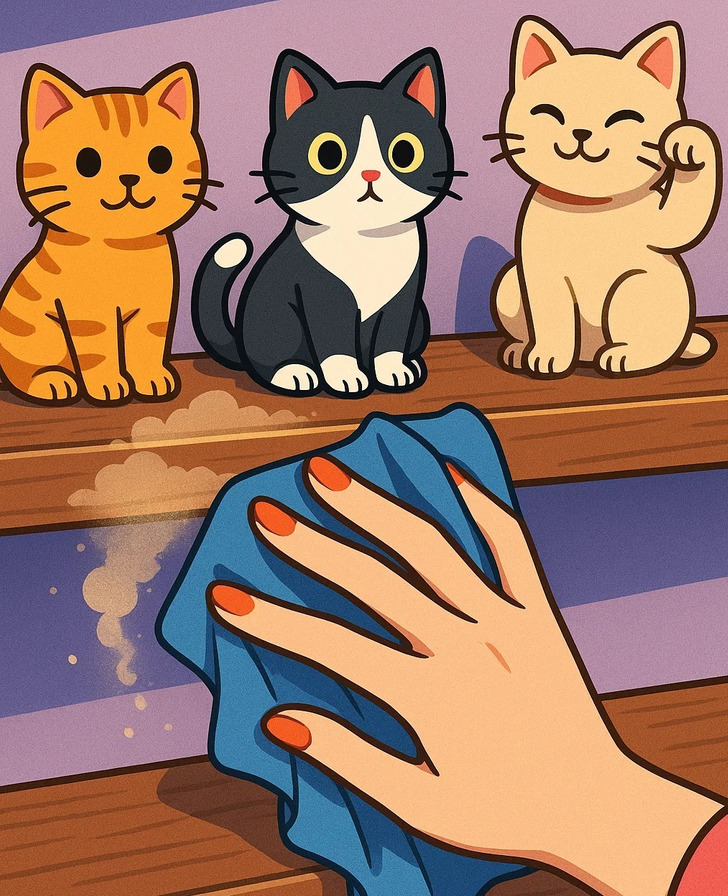
Dry cloths are loved for their speed and simplicity: a quick swipe and the dust seems to be gone. But some people claim that it spreads dust rather than removes it. Wet cloth is considered more effective: it binds dust, doesn’t lift it into the air and leaves surfaces cleaner.
What do experts advise? Wet cleaning really does hold dust better — water attracts it, prevents it from re-settling. It’s particularly useful on wet or sticky surfaces, such as the kitchen table. Dry cleaning is effective on electronics or delicate surfaces (wood, thin lacquer).

Some people think that if you wash yourself clean, there is no difference. Especially if you change your towel often. Others almost spit when they hear this. The face has delicate skin, prone to inflammation. And the body is sweaty, has sebum and bacteria. They say using one towel for everything is like washing your face with a sock.
Most dermatologists agree on one thing: it is better to separate. Towel for the face should be clean and soft (without coarse terry). It should be changed every 2–3 days for normal skin and daily for sensitive and acne-prone skin. A body towel can be changed a little less often — after 3 uses.
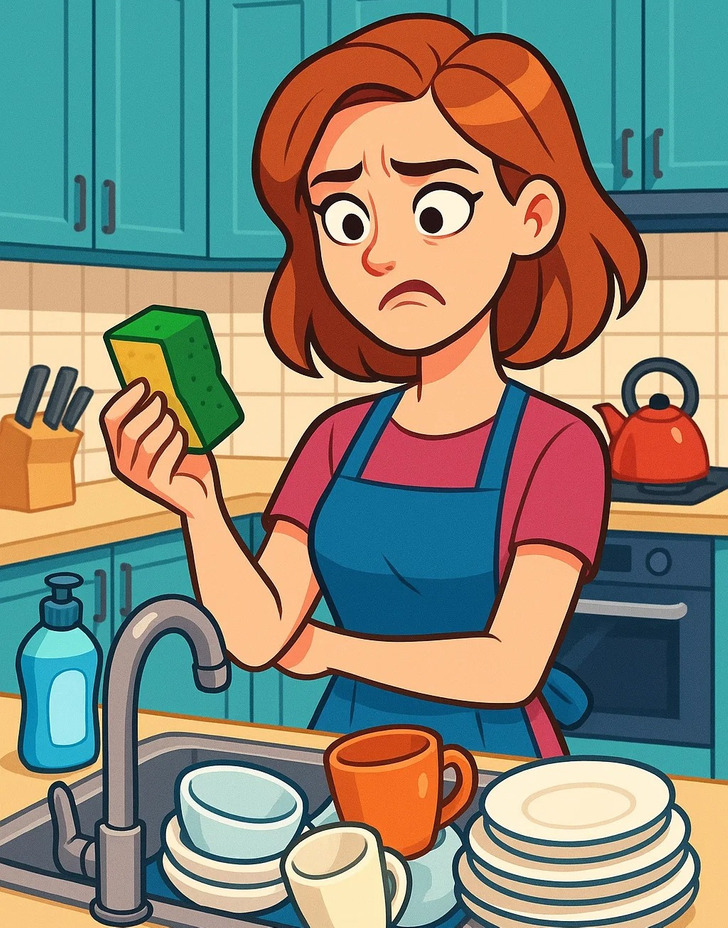
Some people are sure that if a sponge is well wrung out and left to dry, it remains safe. They say that in the past no one cared about germs, and it was okay — they lived, washed dishes and ate soup. Others approach the issue as a mini-sanitary inspection: they consider the sponge the dirtiest object in the kitchen and demand to disinfect it daily — either in the microwave or with boiling water and, of course, to throw it away after a week of service.
Studies confirm: the sponge can indeed accumulate dangerous bacteria, especially if it’s contaminated with raw meat residue. The moist, warm environment inside the sponge is the perfect incubator. If you don’t change your sponge every 5–7 days, you should at least disinfect it daily.
The easiest way to do it is to put a damp sponge in the microwave for 1 minute or run it through a hot cycle in the dishwasher. A solution of bleach (1 teaspoon per liter of water, soak for a minute) is also effective.
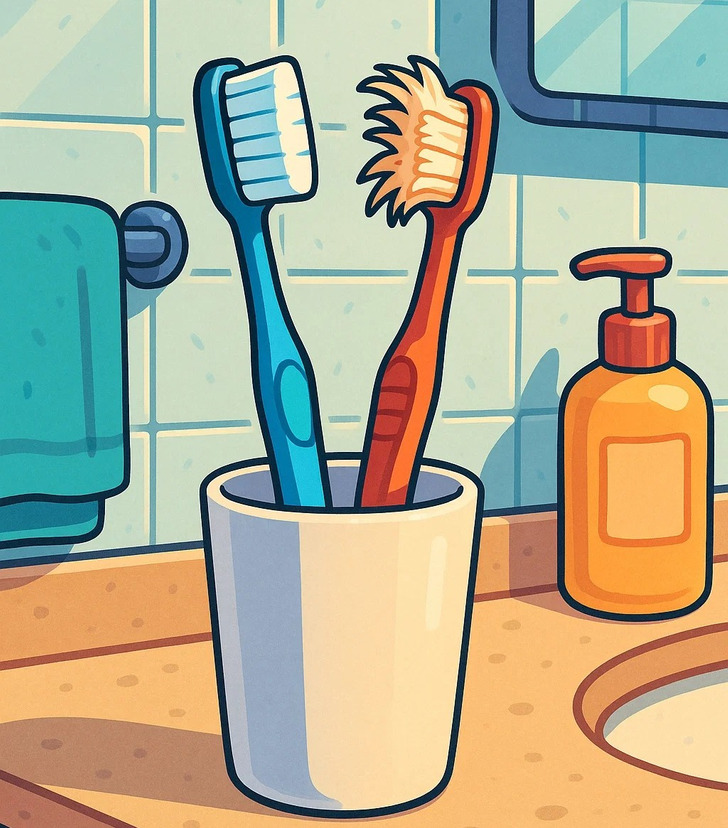
Many people think that if the bristles of a toothbrush are not fluffed up and the handle’s finish is still intact, everything is fine. Why replacing something that is still “as good as new”? There are those who get used to the toothbrush, “It’s comfortable, it doesn’t prick, my hand reaches for it!” — and they use the same brush for months.
The opposite camp are those who buy a new brush almost once a month. They have a strict schedule, like changing tires on a car: they throw away a toothbrush after 3 months of usage, regardless of appearance.
Yes, looks can be deceiving. Even if a brush looks as new, it loses its effectiveness after 3 months of regular use. Over time, the bristles become less elastic and less able to deal with plaque. They can also harbor bacteria, especially if the brush is stored in a humid, closed environment.
If the bristles start to fluff up, replace the toothbrush immediately, even if you’ve been using it only for a couple of weeks. It’s also best to replace the brush immediately after the illness to avoid the risk of re-infection.

The question of how long you can keep cooked food in the fridge is a matter of debate even within the same family. Some people are sure: if the food looks normal and doesn’t smell strange, everything is fine. This food can be safely finished in 5, 6, or even 7 days. Others tend to throw away anything that has been stored for more than a day, believing that harmful bacteria can develop before the food starts to spoil “for real.”
In fact, experts advise eating cooked food within 3–4 days. Even if the food looks and smells fine, bacteria may have already started to multiply in it. The rule of thumb is to put food away into the fridge within 2 hours after cooking. And if the room temperatures are above 90°F, it should be inside the fridge in less than an hour.
And here are some household tricks that can really hack your life.



